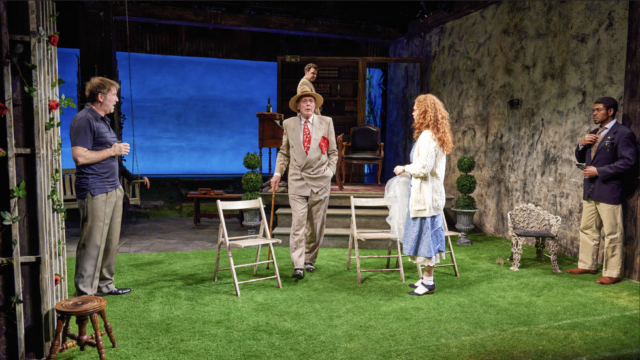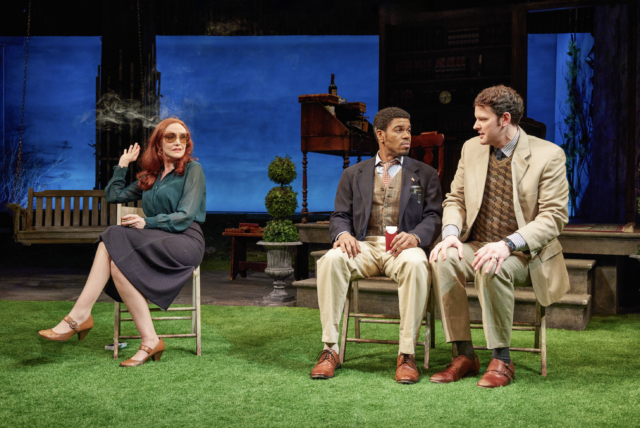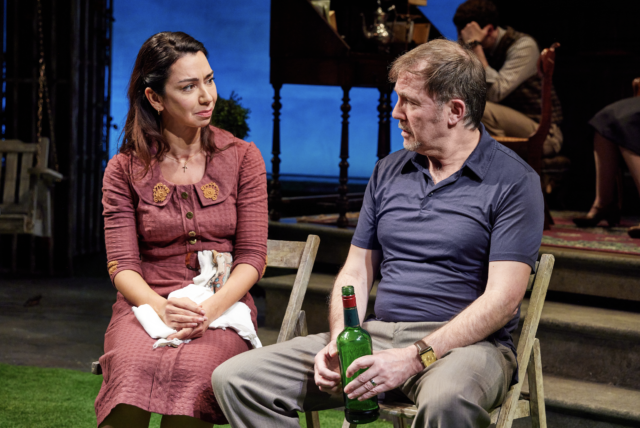
Uncle George (Colin Lane) goes for a stroll in Irish Rep revival of Brian Friel’s Aristocrats (photo by Jeremy Daniel)
ARISTOCRATS
Irish Repertory Theatre, Francis J. Greenburger Mainstage
132 West Twenty-Second St. between Sixth & Seventh Aves.
Wednesday – Sunday through March 3, $60-$125
212-727-2737
irishrep.org
The Irish Rep continues its 2023–24 Friel Project with what it does best, an exquisite revival of a superb Irish drama, in this case Brian Friel’s 1979 Aristocrats.
In 2005, when the company was in danger of losing the lease on its home on West Twenty-Second St., Friel, a native of Northern Ireland, praised the Irish Rep’s excellence, writing about cofounders Charlotte Moore and Ciarán O’Reilly, “The ground they occupy has now been made sacred by them. They have made their space hallowed. It would be unthinkable if 132 West Twenty-Second St. were to slip from them and become secularized. It must remain under their wonderful guardianship.”
Friel passed away in 2015 at the age of eighty-six, coincidentally during a major renovation of the Irish Rep’s hallowed space.
Since its beginnings in 1988, the Irish Rep has staged ten of Friel’s works, including Making History, Molly Sweeney, Dancing at Lughnasa, The Freedom of the City, Afterplay, and The Home Place. The Friel Project kicked off with Translations last fall and continues in March with Philadelphia, Here I Come!, which the troupe previously presented in 1990 and 2005, before concluding with Molly Sweeney, seen at the Irish Rep in 2011 and online in 2020.
Moore first directed Aristocrats in 2009; fifteen years later, she is helming another exemplary production. The story, partially inspired by such classic Chekhov family tales as The Cherry Orchard, Three Sisters, Uncle Vanya, and The Seagull, takes place in Ballybeg Hall in County Donegal in the mid-1970s, as the fortunes of a Catholic family have turned. (Friel wrote adaptations of Three Sisters and Uncle Vanya and set several other plays in the fictional Ballybeg, which means “small town.”)

Alice (Sarah Street) is suspicious as Casimir (Tom Holcomb) shares more information with Tom (Roger Dominic Casey) in Aristocrats (photo by Jeremy Daniel)
Charlie Corcoran, one of New York City’s finest scenic designers, has created a lovely indoor-outdoor set that features a flowered trellis and (fake) grass by an unseen tennis court, a porch swing, a desk in an old, dusty study raised a few steps, and a rear hallway with no front wall, so the audience can see people coming and going. The open set hints at the many secrets that will soon be revealed.
The decaying estate is run by Judith (Danielle Ryan), who lives there with her youngest sister, Claire (Meg Hennessy), who is getting married to a middle-aged widower with four young children; their father, former District Justice O’Donnell (Colin Lane), who has dementia; and their uncle George (Lane), a dapper old gent who rarely speaks. Their brother, Casimir (Tom Holcomb), has traveled from Hamburg for the wedding festivities, arriving without his wife, Helga, and their two children. The fourth sibling, the cynical Alice (Sarah Street), and her husband, the brash bully Eamon (Tim Ruddy), have also come, but it seems that they would prefer to be anywhere else.
As the play opens, family friend and handyman Willie Diver (Shane McNaughton) is installing a baby alarm on the top of a bookcase so the family can hear any noises coming from their father’s room, alerting them if there are any problems. An American scholar, Tom Hoffnung (Roger Dominic Casey), is at the estate researching a book he’s writing on “the life and the life-style of the Roman Catholic big house — by no means as thick on the ground but still there; what we might call a Roman Catholic aristocracy — for want of a better term. . . . And the task I’ve set myself is to explore its political, cultural, and economic influence both on the ascendancy ruling class and on the native peasant tradition.”
Casimir is only too happy to share the estate’s history with Tom, telling stories about such regular literary visitors as Sean O’Casey, G. K. Chesterton, Gerard Manley Hopkins, and W. B. Yeats. But Eamon has a different perspective, advising Tom that the book should be “a great big blockbuster of a gothic novel called Ballybeg Hall — From Supreme Court to Sausage Factory.”
Casimir, who can’t get through on the phone to his wife in Germany, continually plays a game with Claire, a trained classical pianist who suffers from anxiety, guessing the pieces she is playing from an offstage room; they also challenge each other to an invisible game of croquet, representing their vanishing lifestyle. Alice, who has a suspiciously bruised face, drinks too much. Judith, who participated in the Battle of the Bogside, smokes too much. The O’Donnells are a family on the decline, existing in their own world, refusing, or unable, to confront the reality that’s staring down at them.

Judith (Danielle Ryan) and Eamon (Tim Ruddy) can’t forget the past in Friel revival at Irish Rep (photo by Jeremy Daniel)
Moore has a firm grasp on the proceedings, having previously directed five other Friel plays at the Irish Rep; the narrative flows smoothly, then hits hard when revelations come. The sound and original music by Ryan Rumery and M. Florian Staab immerse the audience in the elegiac world the O’Donnells are trying to hold on to, representative of an evolving Ireland as the Troubles pit the Catholics against the Protestants. Birds chirp and Claire’s piano emits beautiful melodies, but that is just background noise that can’t hide the truth. David Toser’s costumes range from casual to elegant to old-fashioned, further evoking the family’s loose relationship with time and change.
The expert cast is highlighted by Holcomb, who portrayed Chekhovian dreamer Conrad Arkadina in Woolly Mammoth’s adaptation of Aaron Posner’s reimagining of The Seagull, the fabulous Stupid Fucking Bird. The tall, thin Holcomb glides through the play, an unreliable narrator who is lost in a snow-globe fantasy.
Street, Hennessy, and Ryan are lovely as the three very different sisters; one of the most tender moments is when Alice and Claire are entwined on the swing, the former more mother than sibling to the latter. McNaughton is warm and friendly as Willie, Casey is stalwart as the observant Tom, and Lane makes the most of his short appearances as Uncle George and the father. Ruddy is strong as Eamon, a tough man who sees through much of the charade. “Between ourselves, it’s a very dangerous house, professor,” he tells Tom. He also refers to the lack of discussion of his mother-in-law as “the great silence.”
In addition to the four plays, the Irish Rep will also be paying tribute to Friel with several special events. On February 26, violinist Gregory Harrington, joined by pianist Simon Mulligan, will perform “Melodies for Friel: Echoing through the Landscape of Ballyweg,” and the Friel Project Reading Series continues through May 2 with readings of eleven Friel plays, anchored around a March 26 benefit presentation of the Tony-winning Dancing at Lughnasa.
[Mark Rifkin is a Brooklyn-born, Manhattan-based writer and editor; you can follow him on Substack here.]